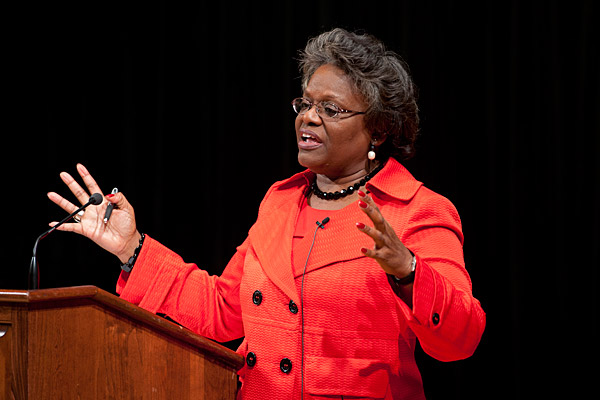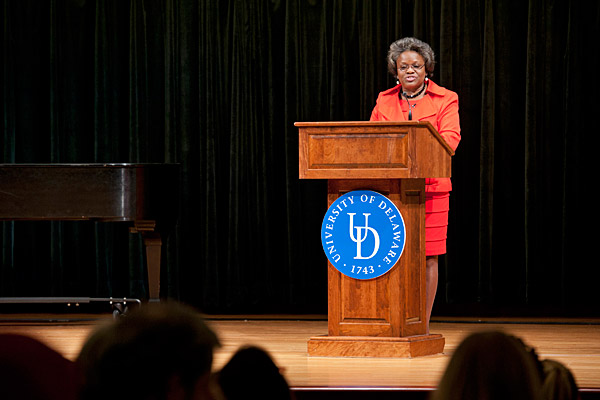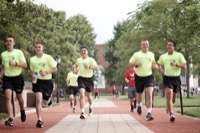


Redding Lecture
Widener's Ammons calls for commitment to education, justice
2:45 p.m., Feb. 28, 2012--Linda Ammons, associate provost and dean of Widener University School of Law, said that America must recommit to education while continuing the push for justice and diversity began by civil rights pioneers such as Delaware’s Louis L. Redding.
Ammons shared her views on the importance of individual and collective efforts needed to meet these goals during the annual Louis L. Redding Lecture on Monday, Feb. 27, in the Gore Recital Hall of the University of Delaware's Roselle Center for the Arts.
People Stories
'Resilience Engineering'
Reviresco June run
The lecture recognizes the life and career of Louis L. Redding, the first African American attorney admitted to the Delaware Bar in 1929.
Sponsors for the event included the Office of Equity and Inclusion, the President’s Diversity Initiative, the Center for the Study of Diversity, the Center for Black Culture, the Department of Black American Studies, the Department of Women’s Studies, the Legal Studies Program and the Office of the General Counsel.
“Louis Redding, who we celebrate in this forum, died in 1998, just before the turn of the century, and as you are aware, he was the first African American in Delaware to be admitted to the state bar, and was a champion for civil rights, pursuing justice in the matter of Brown v. the Board of Education,” Ammons said. “But for Louis Redding and others, like Thurgood Marshall, I would not be standing here before you today as the dean of the Widener School of Law.”
In noting that Redding’s legacy is now part of the great American and Delaware stories, Ammons said her own fondness for storytelling began in her childhood listening to her mother’s favorite soap operas.
“I never learned anything of lasting value from the soaps themselves; however, that does not mean that they cannot be used as a teaching device,” Ammons said. “Why? Narratives, which are used to teach many things.”
The American narrative, Ammons said, continues into the present century and reflects changes achieved by the efforts of civil rights leaders, but also raises serious questions about the nation’s commitment in offering quality education to its citizens.
“What have we accomplished in the area of access to a quality education?” Ammons asked. “What grades would you give to us as a nation, and are we prepared for the complexity and competitiveness of the world that is facing us?”
While history is important, Americans cannot linger too long in what was, but must recognize that things are not what they were and that new solutions based on forward-thinking ideas must be pursued, Ammons said.
“In this country, we have been focusing on the competition among each other, and not paying attention to the rest of the world,” Ammons said. “In my opinion we are not even in the game, and the world will not wait for us to show leadership in this area.”
Ammons said that the issues of diversity, education and the challenges of an international economy demand a new, collective brand of activism to achieve real world results.”
“Superman is not coming. Superman is already here. Superman is us,” Ammons said. “This is a team effort. It always has been and it always will be.”
If the demise of the soap opera represents a shift in entertainment preferences towards reality shows, then Americans also must get real about what its true priorities are as a nation, Ammons said.
“It is up to us to hand on the legacy of Louis Redding,” Ammons said. “I recognize that we cannot all be Louis Redding, but we can all be participants in an American nation that still cares.”
Ammons said that lending others a hand and becoming active participants in improving access to a quality education reflects the true spirit of unsung civil rights heroes such as Louis L. Redding and the Nobel Peace Prize-winning Dr. Martin Luther King Jr., who said, “Every man must decide whether he will walk in the light of creative altruism or in the darkness of destructive selfishness.”
“It’s up to us, Ammons said. “Let people be able to say we insisted on telling the truth, and that we were a generation who acted not just in self-interest, but in the interest of our schools and our communities.”
A reception was held after the event.
Article by Jerry Rhodes
Photos by Evan Krape









